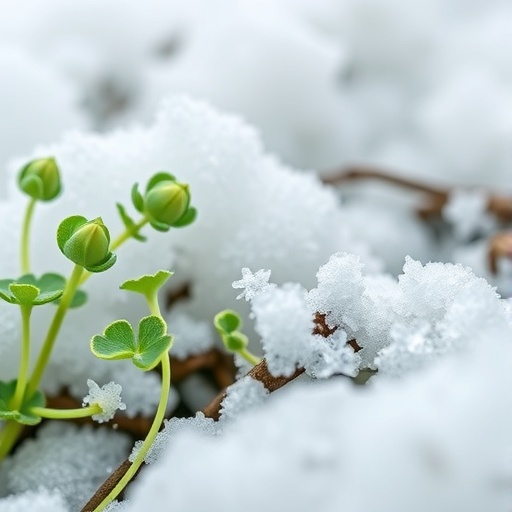In recent years, the understanding of composting processes and their efficiency in nutrient cycling has evolved significantly, particularly as researchers explore ways to optimize composting in less than ideal environmental conditions. A recent study spearheaded by Li et al. (2025) delves into the potential of cold-adapted phosphate solubilizing bacteria to enhance composting procedures, particularly under low temperature conditions. This advancement is particularly pertinent in the face of climate change, which presents challenges for traditional composting operations that usually thrive in warmer temperatures.
The research set out with an ambitious goal: to determine if introducing cold-adapted bacteria could improve the composting process, aid in phosphorus bioactivation, and enhance the overall quality of the mature compost produced. These bacteria are characterized by their unique biochemical abilities to thrive and remain effective in lower temperatures, a characteristic that many traditional composting agents lack. This exploration is not only an innovative approach but is critical for regions that experience cold weather, thereby broadening the potential of composting.
Throughout the study, the researchers adopted a detailed methodology to evaluate the impact of these specific bacterial strains on the composting process. The experimental design included a controlled composting environment where variables such as temperature, moisture content, and bacterial concentration were closely monitored. It became evident that maintaining optimal conditions for these cold-adapted bacteria was crucial for their effectiveness in the composting process. The study revealed that not only could these bacteria survive in lower temperatures, but they also promoted a more efficient breakdown of organic matter.
Phosphorus is a vital nutrient in non-renewable natural cycles, often becoming a limiting factor in soil fertility. Thus, the research aimed at investigating the extent of phosphorus bioactivation accomplished by these bacteria during the composting process. As organic materials break down, phosphorus becomes available for plant uptake, thereby improving soil health. The findings illustrated that by utilizing cold-adapted phosphate solubilizing bacteria, researchers were able to enhance the solubility and availability of phosphorus, indicating a sustainable approach to nutrient recycling in agricultural practices.
Another layer explored in the research was the effect of these bacteria on the maturity of the compost produced. A typical concern in composting is the quality of the end product, particularly when materials are composted under sub-optimal conditions. However, the results indicated that the overall compost quality was significantly improved through the action of these specific bacterial strains. Parameters such as pH, nutrient content, and microbial diversity were measured, illustrating a marked improvement in the maturation process through enhanced microbial activity.
Moreover, the results from this study inform broader ecological considerations as well. With the ability to effectively compost organic materials in colder climates, agricultural practices can become more resilient in the face of climatic adversity. This research promotes a shift from traditional composting methods towards more innovative, adaptable techniques that align with sustainable practices.
The potential applications of these findings extend beyond agriculture. Waste management practices could greatly benefit from adapting composting processes to utilize cold-adapted bacteria, particularly in urban areas where compostable waste is abundant. The effectiveness of composting could reduce landfill use and promote healthier urban environments, thus aligning with global sustainability goals.
This study also holds implications for policy-making and environmental regulations. As communities worldwide strive to adopt greener practices, understanding how to improve composting processes in adverse conditions can inform local policies aimed at reducing waste and increasing compost use in soil management. It emphasizes the importance of research-driven strategies that produce tangible benefits for communities while simultaneously contributing to global environmental health.
In addition to the practical implications, the insights gained from this study may serve as a springboard for further research into microbial applications in environmental management. Future studies could focus on comparing various strains of bacteria, investigating their synergistic effects, and exploring their roles in other biogeochemical cycles. Such inquiries could inform effective strategies for managing resources, improving soil health, and optimizing waste treatment processes.
Ultimately, the innovative approach taken by Li et al. in utilizing cold-adapted phosphate solubilizing bacteria not only provides a practical solution to composting under cold conditions but also paves the way for a sustainable future in agricultural and waste management practices. As global climatic shifts continue, research that champions adaptability and resilience becomes increasingly crucial for food security and sustainable development efforts.
As the uptake of this research spreads, it is anticipated that more practitioners in the field of composting will adopt similar strategies. Workshops, conferences, and dissemination of knowledge through social and traditional media are likely to play significant roles in enhancing awareness and application of these findings.
This investigation serves as a reminder of the intricate relationship between soil, nutrient management, and climate, showcasing how innovation and scientific inquiry can pave the way for a more sustainable agricultural future.
In conclusion, relying on the findings presented by Li et al., one can assert that the future of composting under increasingly variable climate conditions is not only feasible but promising. The integration of cold-adapted phosphate solubilizing bacteria into composting practices represents a significant stride towards maximizing the efficiency and sustainability of nutrient cycling in agricultural systems.
Subject of Research: Cold-adapted phosphate solubilizing bacteria’s role in enhancing composting processes under low temperature conditions.
Article Title: Improve Low Ambient Temperature Composting Process, Phosphorus Bioactivation and Mature Compost Quality by Cold-adapted Phosphate Solubilizing Bacteria.
Article References:
Li, W., Yang, X., Bian, R. et al. Improve Low Ambient Temperature Composting Process, Phosphorus Bioactivation and Mature Compost Quality by Cold-adapted Phosphate Solubilizing Bacteria.
Waste Biomass Valor (2025). https://doi.org/10.1007/s12649-025-03417-7
Image Credits: AI Generated
DOI: https://doi.org/10.1007/s12649-025-03417-7
Keywords: Composting, Cold-adapted Bacteria, Phosphate Solubilizing Bacteria, Phosphorus Bioactivation, Sustainable Agriculture.
Tags: biochemical properties of compost bacteriaclimate change and compostingcold-adapted bacteria in compostingcompost quality improvementcomposting in cold environmentscomposting research advancementsenhancing composting efficiencyinnovative composting solutionslow temperature composting techniquesnutrient cycling in compostphosphate solubilizing bacteriaphosphorus bioactivation in compost





